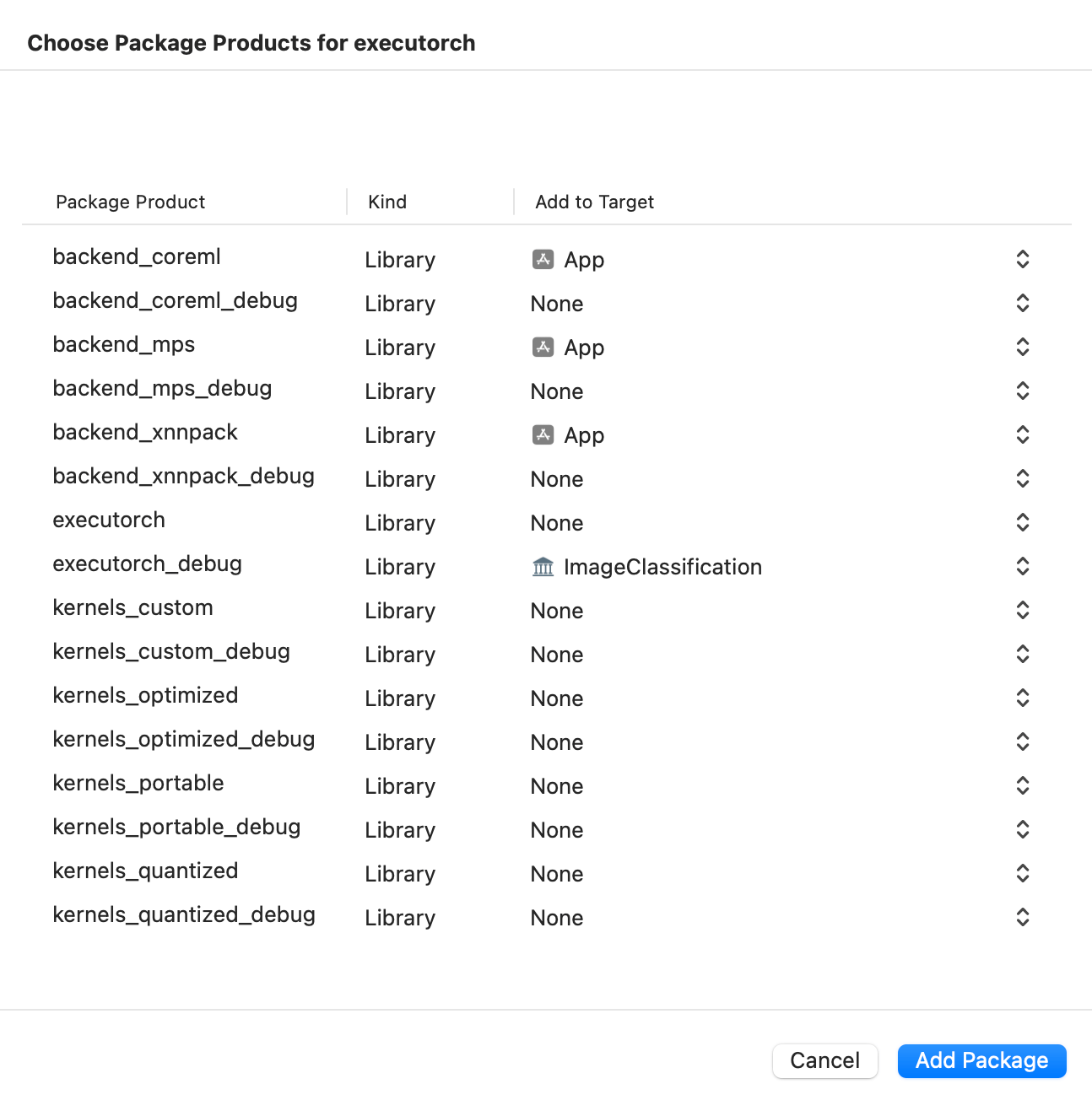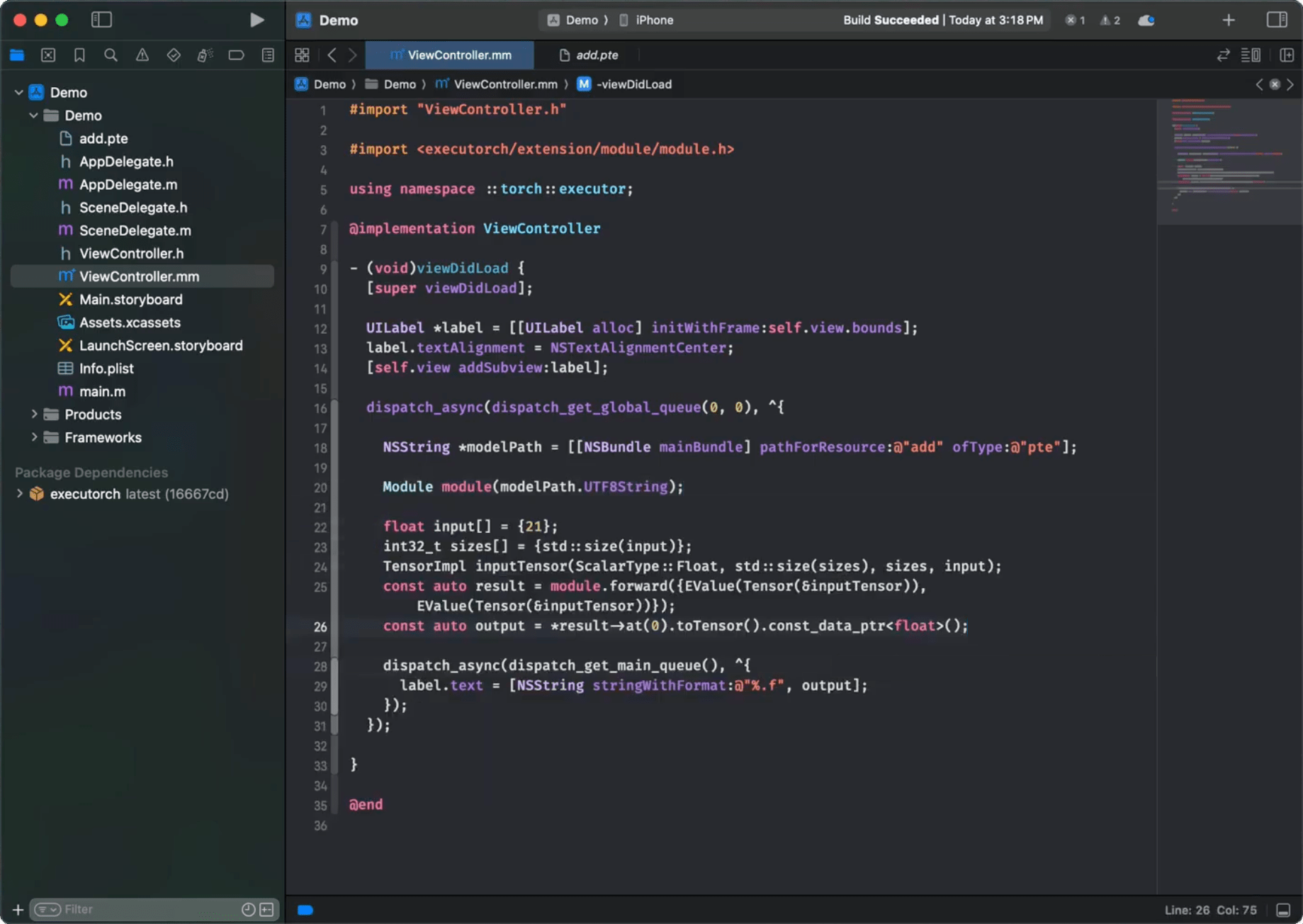Integrating and Running ExecuTorch on Apple Platforms¶
Author: Anthony Shoumikhin
The ExecuTorch Runtime for iOS and macOS is distributed as a collection of prebuilt .xcframework binary targets. These targets are compatible with both iOS and macOS devices and simulators and are available in both release and debug modes:
executorch- Main Runtime componentsbackend_coreml- Core ML backendbackend_mps- MPS backendbackend_xnnpack- XNNPACK backendkernels_custom- Custom kernels for LLMskernels_optimized- Optimized kernelskernels_portable- Portable kernels (naive implementation used as a reference)kernels_quantized- Quantized kernels
Link your binary with the ExecuTorch runtime and any backends or kernels used by the exported ML model. It is recommended to link the core runtime to the components that use ExecuTorch directly, and link kernels and backends against the main app target.
Note: To access logs, link against the Debug build of the ExecuTorch runtime, i.e., the executorch_debug framework. For optimal performance, always link against the Release version of the deliverables (those without the _debug suffix), which have all logging overhead removed.
Integration¶
Swift Package Manager¶
The prebuilt ExecuTorch runtime, backend, and kernels are available as a Swift PM package.
Xcode¶
In Xcode, go to File > Add Package Dependencies. Paste the URL of the ExecuTorch repo into the search bar and select it. Make sure to change the branch name to the desired ExecuTorch version in format “swiftpm-

Then select which ExecuTorch framework should link against which target.

Click the screenshot below to watch the demo video on how to add the package and run a simple ExecuTorch model on iOS.

CLI¶
Add a package and target dependencies on ExecuTorch to your package file like this:
// swift-tools-version:5.9
import PackageDescription
let package = Package(
name: "YourPackageName",
platforms: [
.iOS(.v17),
.macOS(.v10_15),
],
products: [
.library(name: "YourPackageName", targets: ["YourTargetName"]),
],
dependencies: [
// Use "swiftpm-<version>.<year_month_day>" branch name for a nightly build.
.package(url: "https://github.com/pytorch/executorch.git", branch: "swiftpm-0.4.0")
],
targets: [
.target(
name: "YourTargetName",
dependencies: [
.product(name: "executorch", package: "executorch"),
.product(name: "backend_xnnpack", package: "executorch"),
.product(name: "kernels_portable", package: "executorch"),
// Add other backends and kernels as needed.
]),
]
)
Then check if everything works correctly:
cd path/to/your/package
swift package resolve
# or just build it
swift build
Local Build¶
Another way to integrate the ExecuTorch runtime is to build the necessary components from sources locally and link against them. This route is more involved but certainly doable.
Install Xcode 15+ and Command Line Tools:
xcode-select --install
Clone ExecuTorch:
git clone https://github.com/pytorch/executorch.git --depth 1 --recurse-submodules --shallow-submodules && cd executorch
Set up Python 3.10+ and activate a virtual environment:
python3 -m venv .venv && source .venv/bin/activate && pip install --upgrade pip
Install the required dependencies, including those needed for the backends like Core ML or MPS, if you plan to build them as well:
./install_requirements.sh --pybind coreml mps xnnpack
# Optional dependencies for Core ML backend.
./backends/apple/coreml/scripts/install_requirements.sh
# And MPS backend.
./backends/apple/mps/install_requirements.sh
Install CMake:
Download the macOS binary distribution from the CMake website, open the .dmg file, move CMake.app to the /Applications directory, and then run the following command to install the CMake command-line tools:
sudo /Applications/CMake.app/Contents/bin/cmake-gui --install
Use the provided script to build .xcframeworks:
./build/build_apple_frameworks.sh --help
For example, the following invocation will build the ExecuTorch Runtime and all currently available kernels and backends for the Apple platform:
./build/build_apple_frameworks.sh --coreml --mps --xnnpack --custom --optimized --portable --quantized
Append a --Debug flag to the above command to build the binaries with debug symbols if needed.
After the build finishes successfully, the resulting frameworks can be found in the cmake-out directory.
Copy them to your project and link them against your targets.
Linkage¶
ExecuTorch initializes its backends and kernels (operators) during app startup by registering them in a static dictionary. If you encounter errors like “unregistered kernel” or “unregistered backend” at runtime, you may need to explicitly force-load certain components. Use the -all_load or -force_load linker flags in your Xcode build configuration to ensure components are registered early.
Here’s an example of a Xcode configuration file (.xcconfig):
ET_PLATFORM[sdk=iphonesimulator*] = simulator
ET_PLATFORM[sdk=iphoneos*] = ios
ET_PLATFORM[sdk=macos*] = macos
OTHER_LDFLAGS = $(inherited) \
-force_load $(BUILT_PRODUCTS_DIR)/libexecutorch-$(ET_PLATFORM)-release.a \
-force_load $(BUILT_PRODUCTS_DIR)/libbackend_coreml-$(ET_PLATFORM)-release.a \
-force_load $(BUILT_PRODUCTS_DIR)/libbackend_mps-$(ET_PLATFORM)-release.a \
-force_load $(BUILT_PRODUCTS_DIR)/libbackend_xnnpack-$(ET_PLATFORM)-release.a \
-force_load $(BUILT_PRODUCTS_DIR)/libkernels_optimized-$(ET_PLATFORM)-release.a \
-force_load $(BUILT_PRODUCTS_DIR)/libkernels_quantized-$(ET_PLATFORM)-release.a
For a Debug build configuration, replace release with debug in the library file names. Remember to link against the ExecuTorch runtime (libexecutorch) in Debug mode even if other components are built for Release to preserve logs if needed.
You can assign such a config file to your target in Xcode:
Add the
.xcconfigfile to your project.Navigate to the project’s Info tab.
Select the configuration file in the build configurations for Release (or Debug) mode.
Runtime API¶
Check out the C++ Runtime API and Tensors tutorials to learn more about how to load and run an exported model. It is recommended to use the C++ API for macOS or iOS, wrapped with Objective-C++ and Swift code if needed to expose it for other components. Please refer to the Demo App as an example of such a setup.
Once linked against the executorch runtime framework, the target can now import all ExecuTorch public headers. For example, in Objective-C++:
#import <ExecuTorch/ExecuTorch.h>
#import <executorch/extension/module/module.h>
#import <executorch/extension/tensor/tensor.h>
Or in Swift:
import ExecuTorch
Note: Importing the ExecuTorch umbrella header (or ExecuTorch module in Swift) provides access to the logging API only. You still need to import the other runtime headers explicitly as needed, e.g., module.h. There is no support for other runtime APIs in Objective-C or Swift beyond logging described below.
Note: Logs are stripped in the release builds of ExecuTorch frameworks. To preserve logging, use debug builds during development.
Logging¶
We provide extra APIs for logging in Objective-C and Swift as a lightweight wrapper of the internal ExecuTorch machinery. To use it, just import the main framework header in Objective-C. Then use the ExecuTorchLog interface (or the Log class in Swift) to subscribe your own implementation of the ExecuTorchLogSink protocol (or LogSink in Swift) to listen to log events.
#import <ExecuTorch/ExecuTorch.h>
#import <os/log.h>
@interface MyClass : NSObject<ExecuTorchLogSink>
@end
@implementation MyClass
- (instancetype)init {
self = [super init];
if (self) {
#if DEBUG
[ExecuTorchLog.sharedLog addSink:self];
#endif
}
return self;
}
- (void)dealloc {
#if DEBUG
[ExecuTorchLog.sharedLog removeSink:self];
#endif
}
#if DEBUG
- (void)logWithLevel:(ExecuTorchLogLevel)level
timestamp:(NSTimeInterval)timestamp
filename:(NSString *)filename
line:(NSUInteger)line
message:(NSString *)message {
NSString *logMessage = [NSString stringWithFormat:@"%@:%lu %@", filename, (unsigned long)line, message];
switch (level) {
case ExecuTorchLogLevelDebug:
os_log_with_type(OS_LOG_DEFAULT, OS_LOG_TYPE_DEBUG, "%{public}@", logMessage);
break;
case ExecuTorchLogLevelInfo:
os_log_with_type(OS_LOG_DEFAULT, OS_LOG_TYPE_INFO, "%{public}@", logMessage);
break;
case ExecuTorchLogLevelError:
os_log_with_type(OS_LOG_DEFAULT, OS_LOG_TYPE_ERROR, "%{public}@", logMessage);
break;
case ExecuTorchLogLevelFatal:
os_log_with_type(OS_LOG_DEFAULT, OS_LOG_TYPE_FAULT, "%{public}@", logMessage);
break;
default:
os_log(OS_LOG_DEFAULT, "%{public}@", logMessage);
break;
}
}
#endif
@end
Swift version:
import ExecuTorch
import os.log
public class MyClass {
public init() {
#if DEBUG
Log.shared.add(sink: self)
#endif
}
deinit {
#if DEBUG
Log.shared.remove(sink: self)
#endif
}
}
#if DEBUG
extension MyClass: LogSink {
public func log(level: LogLevel, timestamp: TimeInterval, filename: String, line: UInt, message: String) {
let logMessage = "\(filename):\(line) \(message)"
switch level {
case .debug:
os_log(.debug, "%{public}@", logMessage)
case .info:
os_log(.info, "%{public}@", logMessage)
case .error:
os_log(.error, "%{public}@", logMessage)
case .fatal:
os_log(.fault, "%{public}@", logMessage)
default:
os_log("%{public}@", logMessage)
}
}
}
#endif
Note: In the example, the logs are intentionally stripped out when the code is not built for Debug mode, i.e., the DEBUG macro is not defined or equals zero.
Debugging¶
If you are linking against a Debug build of the ExecuTorch frameworks, configure your debugger to map the source code correctly by using the following LLDB command in the debug session:
settings append target.source-map /executorch <path_to_executorch_source_code>
Troubleshooting¶
Slow execution¶
Ensure the exported model is using an appropriate backend, such as XNNPACK, Core ML, or MPS. If the correct backend is invoked but performance issues persist, confirm that you are linking against the Release build of the backend runtime.
For optimal performance, link the ExecuTorch runtime in Release mode too. If debugging is needed, you can keep the ExecuTorch runtime in Debug mode with minimal impact on performance, but preserve logging and debug symbols.
Swift PM¶
If you encounter a checksum mismatch error with Swift PM, clear the package cache using the Xcode menu (File > Packages > Reset Package Caches) or the following command:
rm -rf <YouProjectName>.xcodeproj/project.xcworkspace/xcshareddata/swiftpm \
~/Library/org.swift.swiftpm \
~/Library/Caches/org.swift.swiftpm \
~/Library/Caches/com.apple.dt.Xcode \
~/Library/Developer/Xcode/DerivedData
Note: Ensure Xcode is fully quit before running the terminal command to avoid conflicts with active processes.
